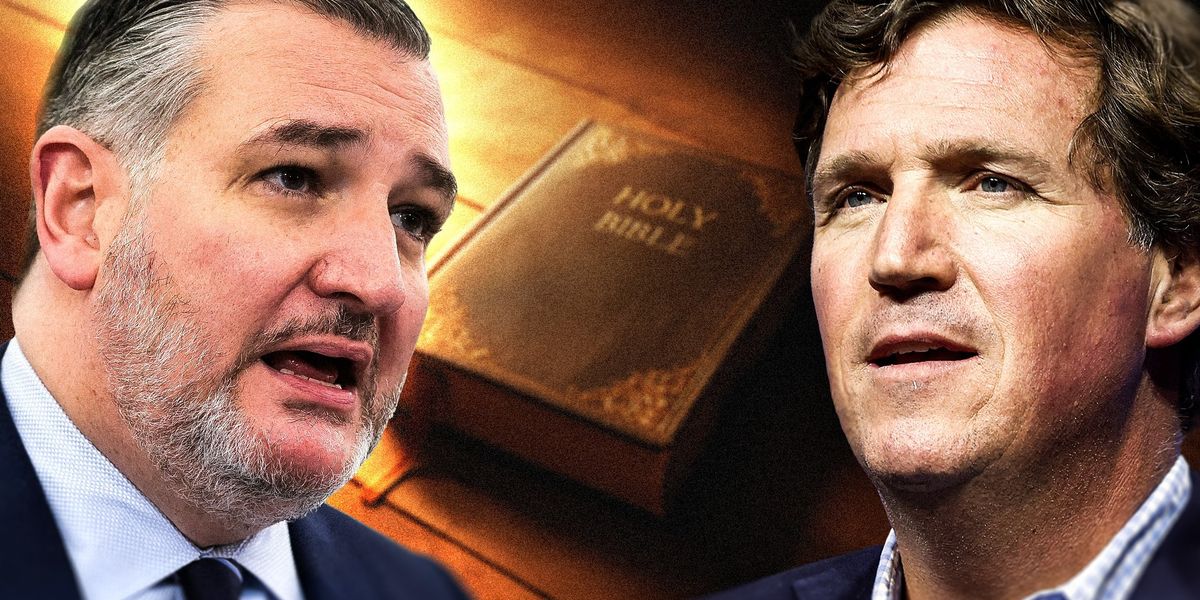Beneath the sparks of Tucker Carlson’s debate with Sen. Ted Cruz (R) about a possible war with Iran lies a far more important — and ancient — question.
One of the most revealing moments of the interview came about halfway through, when Cruz explained why he wants to be the “leading defender of Israel.”
If we reduce scripture to foreign policy talking points, we risk baptizing political agendas in the name of God while justifying more war.
His reason? “As a Christian, growing up in Sunday school, I was taught from the Bible, ‘Those who bless Israel will be blessed, and those who curse Israel will be cursed.'”
When Carlson pressed Cruz on whether that means Christians must support the modern nation-state of Israel, Cruz replied, “Biblically, we are commanded to support Israel.”
That response failed to satisfy Carlson.
“But hold on — define Israel,” Carlson responded.
More specifically, Carlson asked Cruz if he believes Genesis is referring to the modern nation-state of Israel as it currently exists as a political entity, with its current leadership and borders.
“Yes,” Cruz responded.
Carlson’s interjection — “define Israel” — gets at the heart of an important question, a theological fault line in American Christianity: What is Israel, and is there a difference between the modern nation-state of Israel and biblical Israel?
The answer is often treated as self-evident. But the assumption that the modern nation-state of Israel is identical to biblical Israel is not just a matter of political opinion. It’s a theological claim, and it deserves biblical scrutiny.
What is (biblical) Israel?
The verse that Cruz cites comes from one of the most important passages in the entire Bible. In Genesis 12, God calls Abraham to leave his family and homeland and go to a new land that he will show Abraham.
Then, God tells Abraham (Genesis 12:2-3):
I will make you into a great nation, and I will bless you; I will make your name great, and you will be a blessing. I will bless those who bless you, and whoever curses you I will curse; and all peoples on earth will be blessed through you.
Notice that God did not say that “Israel will be blessed.” Rather, the subject of God’s blessing is “you.” God tells Abraham that he will be blessed. How will Abraham be blessed? Through his descendants, who will become a “great nation” and a people through whom the entire earth is blessed.
The Hebrew word “Israel,” in fact, doesn’t appear in the Old Testament until Genesis 32:28. It’s first used to explain why Abraham’s grandson Jacob is called “Israel.” Throughout the rest of the Torah, Israel exclusively refers to a people group: The descendants of Jacob, who are the 12 tribes of Israel.
And Israel, indeed, is unique and set apart.
After God rescues his people from the hand of Pharaoh and brings them to Mount Sinai, God enters into a covenant with Israel and reveals their vocation.
Exodus 19:3-6:
Then Moses went up to God, and the Lord called to him from the mountain and said, “This is what you are to say to the descendants of Jacob and what you are to tell the people of Israel: ‘You yourselves have seen what I did to Egypt, and how I carried you on eagles’ wings and brought you to myself. Now if you obey me fully and keep my covenant, then out of all nations you will be my treasured possession. Although the whole earth is mine, you will be for me a kingdom of priests and a holy nation.’ These are the words you are to speak to the Israelites.”
Israel is God’s “special possession” (if its people obey him and keep God’s covenant). But for what purpose? To be a “kingdom of priests” and a “holy nation.”
What this means is that God established Israel as a unique and set-apart nation for the purpose of mediating God — which is the job of a priest — to the nations. Israel received special honor not for an ambiguous reason, but because God had enacted a cosmic redemption mission since the fall in Genesis 3. And central to God’s redemption plan was a priestly people through whom God could be mediated and, therefore, reconciled to his people.
But as the biblical story unfolds, Israel fails its mission. Israel breaks the covenant, pursues other gods, and becomes like the other nations, ultimately abdicating the priestly vocation. Blessing, the prophets warn, is not tied to ethnicity or geography — but faithfulness to God.
Because of the people’s unfaithfulness, curse comes to Israel, and God allows Israel to be exiled. In the 8th century B.C., the Assyrian Empire conquers the Northern Kingdom of Israel and takes the people into exile. Those 10 tribes of Israel are mostly lost to history because of their horrendous failures.
Yet God is faithful. He continues to work through the Southern Kingdom of Judea (comprised of the tribes of Judah and Benjamin), but they, too, fail, and are exiled to Babylon in the 6th century B.C.
Fortunately, the story doesn’t end there. God preserves a remnant from the seed of David, and Israel’s mission is ultimately fulfilled by a Jewish man from a backwater town in Galilee: Jesus of Nazareth. He is the true and faithful Israelite who perfectly fulfills Israel’s vocation and perfectly keeps the covenant. Jesus is the great high priest, the anointed one, and the prophet of prophets.
Through Jesus’ life, death, and resurrection, God is mediated to all people. The blessings that God promised Abraham are finally realized.
“If you belong to Christ, then you are Abraham’s seed, and heirs according to the promise,” the apostle Paul writes in Galatians 3:29.
In other words, the true Israel — the true children of Abraham — is not defined by ethnicity, politics, or national barriers. It is defined by faith in Jesus. Gentiles are grafted into the family of God through Christ (Romans 9-11).
This is the fulfillment of Israel’s mission, the Old Testament promises, and God’s redemption plan.
Why this matters
How you define “Israel” carries tremendous theological and political weight. If we conflate the ancient covenant people of God with the modern nation-state, we risk distorting the gospel and global politics.
The modern state of Israel is not the covenant people of God. It is a secular nation with borders, politicians, and politics that serve its interests — just like every other nation. It did not exist until 1948, and, in fact, there was a campaign to name the new nation “Judea,” a nod to the fact that Jews were settling there. But David Ben-Gurion chose the name “Israel” for reasons of political, symbolic, and geographic pragmatism.
This doesn’t mean that Christians shouldn’t care about Israel or support its right to exist. Christians should pray for Israel and for peace in the Holy Land.
But our view of Israel must not be rooted in misreadings and misunderstandings of the Bible. If we reduce scripture to foreign policy talking points, we risk baptizing political agendas in the name of God while justifying more war.
In biblical interpretation, context is king.
The true “Israel of God,” according to the apostle Paul, is the church (Galatians 6:16). To “bless Israel,” therefore, does not mean offering unconditional support to a foreign country that shares a name with the biblical “Israel.” It means honoring the covenant fulfilled in Christ and recognizing that the mission of Israel is being carried forward by faithful Christians, Jew and Gentile alike.
Does the Bible command Christians to support the modern nation-state of Israel? No.
If Christians want to be faithful to God and wise in matters of global affairs, we should begin by answering with biblical clarity the theological question that Carlson implicitly raised: What is (biblical) Israel?
Israel is the people of God, shaped by covenant and defined by hope — and ultimately revealed in Jesus Christ. Those who belong to him are the children of Abraham, heirs according to the promise.
Read the full article here








![Viral Video Shows Restaurant Owner Confronting Breastfeeding Mom in Georgia [WATCH] Viral Video Shows Restaurant Owner Confronting Breastfeeding Mom in Georgia [WATCH]](https://www.boredtrashpanda.com/wp-content/uploads/2025/12/2025.12.15-12.26-boredtrashpanda-693ffe907545b.jpg)


